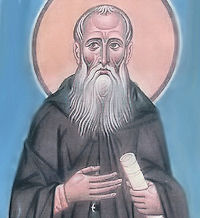Easter: May 8th
Friday of the Fourth Week of Easter
Other Commemorations: St. Acacius, Martyr (RM); St. Arsenius, Deacon (RM); Apparition of St. Michael the Archangel (Hist)
» Enjoy our Liturgical Seasons series of e-books!
According to the 1962 Missal of St. John XXIII the Extraordinary Form of the Roman Rite, today is the feast of the apparition of St. Michael. The feast commemorates an apparition of St. Michael on the summit of Monte Gargano, in Italy on the Adriatic coast, and the dedication of the sanctuary built on the site of the apparition. It is also the feast of St. Acathius, a priest at Sebaste, Armenia, during Diocletian's persecution.
St. Acacius (or Achatius)
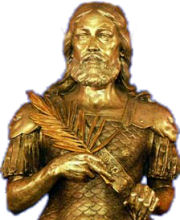 St. Achatius, is one of the Holy Helpers who, as a Roman soldier, died for Christ. He was a native of Cappadocia and as a youth joined the Roman army during the reign of Emperor Hadrian, attaining the rank of captain. One day, when leading his company against the enemy, he heard a voice saying to him, "Call on the God of Christians!" He obeyed, was instructed, and received Baptism. Filled with zeal, he henceforth sought to convert also the pagan soldiers of the army. When the emperor heard of this, Achatius was thrown into prison, then placed on the rack, bound to a post and scourged, because he refused to offer sacrifice to the idols. When all these tortures availed nothing, he was brought before the tribune Bibianus.
St. Achatius, is one of the Holy Helpers who, as a Roman soldier, died for Christ. He was a native of Cappadocia and as a youth joined the Roman army during the reign of Emperor Hadrian, attaining the rank of captain. One day, when leading his company against the enemy, he heard a voice saying to him, "Call on the God of Christians!" He obeyed, was instructed, and received Baptism. Filled with zeal, he henceforth sought to convert also the pagan soldiers of the army. When the emperor heard of this, Achatius was thrown into prison, then placed on the rack, bound to a post and scourged, because he refused to offer sacrifice to the idols. When all these tortures availed nothing, he was brought before the tribune Bibianus.
Asked by him what was his name and country, Achatius replied, "My name is Christian because I am a follower of Christ; men call me Achatius. My country is Cappadocia. There my parents lived; there I was converted to the Christian faith, and was so inspired by the combats and sufferings of the Christian Martyrs that I am resolved to shed my blood for Christ to attain heaven." Then Bibianus ordered him to be beaten with leaden clubs, after which he was loaded with chains and returned to the prison.
After Achatius had been in prison seven days, Bibianus was called to Byzantium and ordered all prisoners to be transported there. On the journey Achatius suffered greatly, for his entire body was covered with wounds, his chains were galling, the guards were cruel and the roads were bad. He thought himself dying. Praying to God, a voice from the clouds answered him, "Achatius, be firm!" The soldiers of the guard were terrified and asked each other, "What is this? How can the clouds have a voice?" Many prisoners were converted. The next day some of the converts saw a number of men in shining armor speaking to Achatius, washing his wounds and healing them, so that not even a scar remained.
Arrived in Byzantium the Saint was again cast into prison, and after seven days dragged before the judge. When neither promises nor the cruelest torments shook the constancy of the brave confessor of the Faith, the judge sent him to Flaccus, the proconsul of Thracia, who imprisoned him for five days and meanwhile read the records of his former trials. Then he ordered him to be beheaded. Achatius suffered death for Christ on May 8, 311.
Note: St. Achatius' name is also spelled Acacius. He is invoked for headaches.
—Excerpted from the The Fourteen Holy Helpers by Fr. Bonaventure Hammer, O.F.M.
Patronage: against pain; against headaches; soldiers; archdiocese of Guardavalle, Italy; Catanzaro-Squillace, Italy
Symbols and Representation: centurion; soldier carrying cruets; soldier carrying a chalice; soldier carrying a bunch of thorns; soldier carrying a dead tree bough; soldier carrying sacred vessels; soldier in armor with standard and shield; soldier in golden armor; soldier with a palm branch of martyrdom; soldier with a hand full of thorns; soldier with large cross; with Saint Theodore Tyro
Highlights and Things to Do:
- Read Legends of the Fourteen Holy Helpers – Saint Achatius, Martyr
- See August 8 for more information on the Fourteen Holy Helpers.
St. Arsenius the Great
Arsenius was born to two rich parents in A.D. 350 in Rome. His father was a senator and judge. His parents were very righteous and honorable people. They sent Arsenius to the teachers of the Church and was raised in the fear of God. He was eager to read the Scriptures and the holy books, and was ordained a deacon then an arch-deacon by Saint Damasus the Bishop of Rome.
After his parents died, his sister Afrositty and he gave all their riches to the poor, and lived an ascetic life. Arsenius became famous for his righteousness and wisdom. He was a disciple of Rophenius the monastic historian from whom he admired the Egyptian monastic life and its fathers, and he wished to meet them.
When the Emperor Theodosius the Great wanted a man to whom he might entrust the education of his children, Saint Damasus recommended Arsenius, a man of senatorial rank learned in both sacred and worldly knowledge. Arsenius accordingly went to Constantinople in 383 A.D. and was appointed to the post by Theodosius who, coming once to see Arcadius and Honorius at their studies, found them sitting whilst Arsenius talked to them standing: at once he caused Arsenius to sit and ordered them to listen to him standing. But neither then nor in after-life were the two augusti any credit to such a father or such a tutor; added to this Arsenius had always a tendency to a retired life.
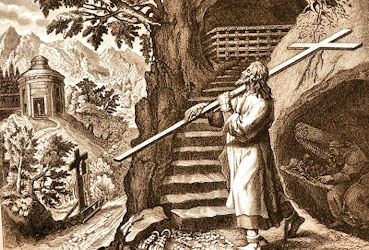
When therefore after over ten years at the court he seemed clearly to hear the voice of God through the Gospel, "For what is a man profited, if he shall gain the whole world, and lose his own soul?" (Matthew 16:26). He left Constantinople and came by sea to Alexandria and fled into the wilderness. When he first presented himself to Abba Macarius the Great, the father of the monks of Skete, he recommended him to the care of Saint John the Dwarf to try him. In the evening, when the rest of the monks sat down to take their meal, Saint John left Arsenius standing in the middle without inviting him. Such a reception was a severe trial to an ex-courtier; but was followed by another much rougher, for Saint John took a loaf of bread and threw it on the ground before him, biding him with an air of indifference to eat it if he would. Arsenius cheerfully sat on the ground and took his meal. Saint John was so satisfied with his behavior that he required no further trial for his admission, and said, "This man will make a monk."
Arsenius at first used thoughtlessly to do certain things which he had done in the world, which seemed inappropriate to his new companions, for instance, to sit cross-legged. The seniors were unwilling through the respect they bore him to tell him of this in public, so one agreed with another that he should put himself in that posture and then be rebuked for his immodesty. Arsenius saw that the reproof was meant for him, and corrected himself of that trick.
Being asked one day why he, being so well educated, sought the instruction and advice of a certain monk who was an utter stranger to all literature, he replied, "I am not unacquainted with the learning of the Greeks and the Romans; but I have not yet learned the alphabet of the science of the saints, whereof this seemingly ignorant Egyptian is master". Evagrius of Pontus who, after he had distinguished himself at Constantinople by his learning, had retired into the desert of Nitria in 385, expressed surprise that many learned men made no progress in virtue, whilst many Egyptians, who did not even know the letters of the alphabet, arrived at a high degree of contemplation. Arsenius answered, "We make no progress because we dwell in that exterior learning which puffs up the mind; but these illiterate Egyptians have a true sense of their own weakness, blindness, and insufficiency; and by that very thing they are qualified to labor successfully in the pursuit of virtue."
Arsenius often passed the whole night in watching and prayer, ad on Saturdays it was his custom to go to prayers turning his back to the evening sun, and continue with his hands lifted up to Heaven till the sun shone on his face the next morning.
One of the emperor's officers brought him the will of a senator, his relation, who was lately dead, and had left him his heir. The saint took the will and would have torn it to pieces, but the officer begged him not to, saying such an accident would get him in trouble. Arsenius, however, refused the estate, saying "I died eleven years ago and cannot be his heir".
He employed himself in making mats of palm-tree leaves; and he never changed the water in which he moistened the leaves, but only poured in fresh water upon it as it wasted. When some asked him why he did not cast away the filthy water, he answered, "I ought to be punished by this smell for the self-indulgence with which I formerly used perfumes". He lived in the most utter poverty, so that in an illness, having need for a small sum to procure him some little necessities, he was obliged to beg for it.
Due to his desire for quiet and solitude, Saint John allowed Saint Arsenius to live alone in a hidden cave in the desert 32 miles away. He would seldom see strangers who came to visit him, but Theophilus, Pope of Alexandria, came one day in company with others to visit him, and begged he would speak on some subject for the good of their souls. The saint asked them whether they were disposed to comply with his directions; and being answered in the affirmative, he replied, "I entreat you then that, whenever you are informed of Arsenius' abode, you would leave him to himself and spare yourselves the trouble of coming after him". He never visited his brethren, contenting himself with meeting them at spiritual conferences. The abbot Mark asked him one day why he so much shunned their company. The saint answered, "God knows how dearly I love you all; but I find I cannot be both with God and with men at the same time; nor can I think of leaving God to converse with men."
This disposition, however, did not hinder him from giving spiritual instruction to his brethren, and several of his sayings are recorded. He said often, "I have always something to repent for after having talked, but have never been sorry for having been silent."
Nothing is so much spoken of about Arsenius as his gift of tears, weeping both over his own shortcomings and those of the world, particularly the feebleness of Arcadius and the foolishness of Honorius.
Saint Arsenius was tall and comely but stooped a little in his old age; he had graceful carriage and a certain shining beauty and air of both majesty and meekness; his hair was all white, and his beard reached down to his girdle, but the tears which he shed continually had worn away his eye-lashes. He lived in the same austere manner till the age of about ninety-five; he spent forty years in the desert of Skete, till a raid of barbarians compelled him to forsake this abode about the year 434. He retired to the rock of Troe, over against Memphis, and ten years after to the island of Canopus, near Alexandria; but not being able to bear the neighborhood of that city, he returned to Troe, where he died.
His brethren, seeing him weep in his last hours, said to him, "Father, why do you weep? Are you, like others, afraid to die?" The saint answered, "I am very afraid - nor has this dread ever forsaken me from the time I first came into these deserts". Notwithstanding his fear, Saint Arsenius died in great peace, full of faith and of that humble confidence which perfect charity inspires, in the year 445.
—Excerpted from Coptic Orthodox Church Network
Highlights and Things To Do:
- To learn more about St. Arsenius the Great, see
- Two quotes attributed to Arsenius the Great:
- I have often repented of having spoken, but never of having been silent."
- If we seek God, he will show himself to us, and if we keep him, he will remain close to us.
Apparition of St. Michael
It is evident from Holy Scripture that God is pleased to make frequent use of the ministry of the heavenly spirits in the dispensations of His providence in this world. The Angels are all pure spirits; by a property of their nature, they are immortal, as is every spirit. They have the power of moving or conveying themselves at will from place to place, and such is their activity that it is not easy for us to conceive of it. Among the holy Archangels, Saints Michael, Gabriel, and Raphael are particularly distinguished in the Scriptures. Saint Michael, whose name means Who is like unto God?, is the prince of the faithful Angels who opposed Lucifer and his followers in their revolt against God. Since the devil is the sworn enemy of God’s holy Church, Saint Michael is given to it by God as its special protector against the demon’s assaults and stratagems.
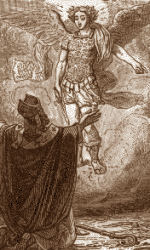
Various apparitions of this powerful Angel have proved the protection of Saint Michael over the Church. We may mention his apparition in Rome, where Saint Gregory the Great saw him in the air sheathing his sword, to signal the cessation of a pestilence and the appeasement of God’s wrath. Another apparition to Saint Aubert, bishop of Avranches in France, led to the construction of Mont-Saint-Michel in the sea, a famous pilgrimage site. May 8th, however, is destined to recall another no less marvelous apparition, occurring near Monte Gargano in the Kingdom of Naples.
In the year 492, a man named Gargan was pasturing his large herds in the countryside. One day a bull fled to the mountain, where it could not be found. When its refuge in a cave was discovered, an arrow was shot into the cave, but the arrow returned to wound the one who had sent it. Faced with this mysterious occurrence, the persons concerned decided to consult the bishop of the region. He ordered three days of fasting and prayers. After three days, the Archangel Michael appeared to the bishop and declared that the cavern where the bull had taken refuge was under his protection and that God wanted it to be consecrated under his name and in honor of all the Holy Angels.
Accompanied by his clergy and people, the pontiff went to that cavern, which he found already disposed in the form of a church. The divine mysteries were celebrated there, and there arose in this same place a magnificent temple where the divine Power has wrought great miracles. To thank God’s adorable goodness for the protection of the holy Archangel, the effect of His merciful Providence, this feast day was instituted by the Church in his honor.
It is said of this special guardian and protector of the Church that, during the final persecution of Antichrist, he will powerfully defend it: “At that time shall Michael rise up, the great prince who protects the children of thy people.”
—Excerpted from Little Pictorial Lives of the Saints, a compilation based on Butler’s Lives of the Saints and other sources by John Gilmary Shea (Benziger Brothers: New York, 1894); Vie des Saints pour tous les jours de l’année, by Abbé L. Jaud (Mame: Tours, 1950).
Apparition of St. Michael the Archangel:
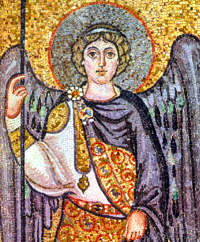 Of all the angels, none is accorded greater veneration than St. Michael; his cult dates to ancient Christian times. He is the protector and patron of the Church on earth, and leads departed souls into paradise. Traditionally his fast has been celebrated on September 29; then in the sixth century a feast called the Apparition of St. Michael at Siponte, Gargano, was added locally, but soon spread to the universal Church. What actually is commemorated today is the dedication of this church.
Of all the angels, none is accorded greater veneration than St. Michael; his cult dates to ancient Christian times. He is the protector and patron of the Church on earth, and leads departed souls into paradise. Traditionally his fast has been celebrated on September 29; then in the sixth century a feast called the Apparition of St. Michael at Siponte, Gargano, was added locally, but soon spread to the universal Church. What actually is commemorated today is the dedication of this church.
The best known among the apparitions of our archangels is that which took place about 590 A.D. atop Castel Sant' Angelo, and from which the fortification took its present name. In that year, Pope Gregory the Great ordered a great penitential procession on the occasion of a plague; to indicate that his prayers were heard, the archangel appeared and replied his sword in its scabbard. Today's feast has not proven too popular; that in honor of St. Michael in September is much better known.
—Excerpted from The Church's Year of Grace by Pius Parsch
Patronage: against danger at sea; against temptations; ambulance drivers; arms manufacturers; artists; bakers; bankers, banking; barrel makers, coopers; battle; cemeteries, graveyards; cutlers, knife grinders, knife sharpers; dying people; emergency medical technicians, EMTs, paramedics; fencers; fencing; gilders; greengrocers; grocers; haberdashers; hatmakers, hatters, cap makers; holy death; knights; mariners, sailors, watermen, boatmen; merchants; milleners; painters; paratroopers; pharmacists, druggists; police officers; radiologists; radiotherapists; scale makers; security guards; sick people; soldiers; Spanish police officers; storms at sea; swordsmiths
See CatholicSaints.info for a full list of patronage, especially of locations.
Highlights and Things to Do:
- Read more about this vision of St. Michael:
- Find out more of the Santuario San Michele Arcangelo on Mount Gargano in southern Italy where the apparition occurred.


